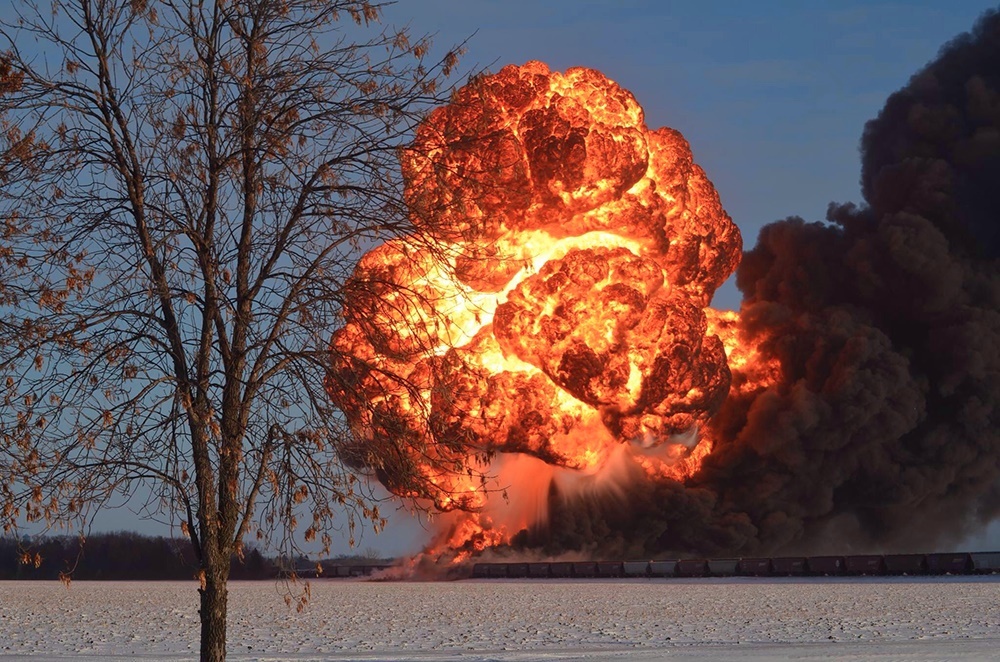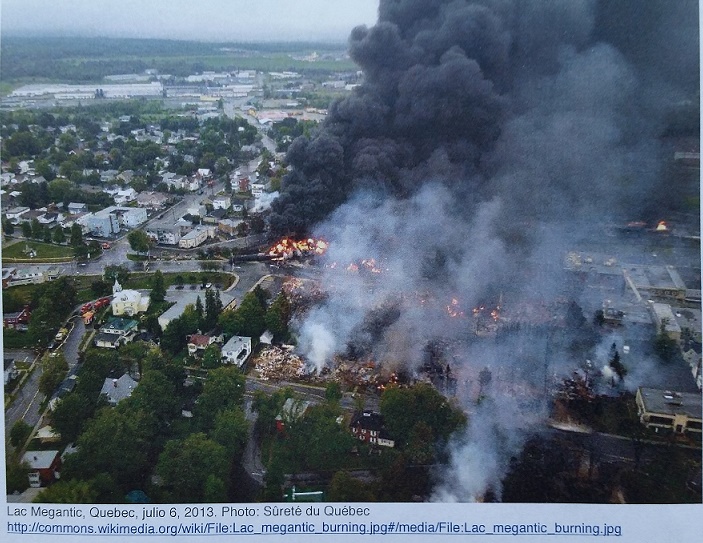Reporte concluye La Cruda Injusticia de los Carriles Una Gran Amenaza en CA
Spanish and English Press Release
Contacts:
Eddie Scher, ForestEthics, eddie@forestethics.org, 415-815-7027
Alicia Rivera, Communities for Better Environment, alicia@cbecal.org, 310-634-7839
Andrés Soto, Communities for a Better Environment, andres@cbecal.org, 510-282-5363

Tuesday, June 30, 2015
[Oakland, CA] Public interest groups today released the Crude Injustice on the Rails report evaluating the disparate threat to people of color and low-income communities from explosions and pollution from crude oil trains in California.The groups ForestEthics and Communities for a Better Environment evaluated oil train routes and US Census data to determine who was at greatest risk from pollution and potential oil trains derailments and explosions, like the fatal July 2013 Lac Megantic oil train disaster.
“It’s simple, oil trains contribute to environmental racism in California,” says Nile Malloy, Northern California Program Director, Communities for a Better Environment. “Environmental justice communities like Richmond and Wilmington that already live with the highest risk are hardest hit. It’s time for a just and quick transition to clean energy.”
The groups report that Californians of color are more likely to live in the oil train blast zone, the dangerous one-mile evacuation zone in the case of an oil train derailment and fire. While 60 percent of Californians live in environmental justice communities – communities with racial minorities, low income, or non-English speaking households – 80 percent of the 5.5 million Californians with homes in the blast zone live in environmental justice communities. Nine out of ten of California’s largest cities on oil train routes have an even higher rate of discriminatory impact than the state average. In these cities, 82–100 percent of people living in the blast zone are in environmental justice communities.
“The maps paint a scary picture of who lives with threat of explosions and the health risks from pollution and disruption from dangerous 100-plus car crude oil trains,” says Matt Krogh, ForestEthics extreme oil campaign director and one of the authors of the report. “In California you are 33 percent more likely to live in the blast zone if you live in a nonwhite, low income, or non-English speaking household.”
The groups recommend immediate federal, state and local action to address this environmental discrimination, including a moratorium on oil imports into the state by rail, and action by the state attorney general, US EPA Office of Civil Rights, and US Department of Justice to enforce federal and state laws.
“Oil trains are a threat to our communities and to our climate — but the threat is not evenly shared,” says Todd Paglia, ForestEthics executive director. “The Crude Injustice report shows that in California people of color are the most exposed to these dangers demonstrating another area where our nation’s past and current challenges on issues of race show up loud and clear.”
“Our communities are working to build healthier, greener and thriving communities,” says Alicia Rivera, Communities for a Better Environment Los Angeles organizer. “Crude by rail is another deadly threat to our families. This is why we are joining across communities to demand environmental rights along the rails, on July 11th,” Rivera said.
July 6-11 ForestEthics, CBE, and other groups are coordinating the Stop Oil Trains Week of Action with more than 100 events across the US and Canada.
The report, Crude Injustice on the Rails: Race and the Disparate Risk from Oil Trains in California, is available in English and Spanish.
##
Jueves, Junio 30, 2015
[Oakland, CA] Grupos de interes publico dieron a conocer un reporte — La Cruda Injusticia de los Carriles — mostrando que trenes petroleros contribuyen al racismo ambiental en California, basandose en datos del mismo gobierno que muestran que gente de bajos recursos, Latinos, y de color viven inequitativamente cerca de areas de descarrilamiento, explosiones y zonas de evacuacion por incendio a lo largo de las rutas ferroviales de crudo del estado.Los grupos Forest Ethics y Communities for a Better Environment o CBE evaluaron las rutas ferroviarias del petroleo y datos de censo de E.U para determinar quien estaba en mayor riezgo de contaminacion y de descarrilamiento y explosiones de crudo, como el fatal desastre ferroviario en Lac Megantic en del 2013.“Es muy obvio, trenes petroleros contribuyen al racismo ambiental en CA”, dice Nile Malloy, Director Programatico de CBE en el Norte de CA. “Comunidades que sufren injusticia ambiental como Richmond y Wilmington que ya viven con el más alto riesgo son los más afectados. Es hora para una transición justa y rápida hacia la energía limpia.”
Los grupos reportan que los Californianos denominados grupos de color estan mas propensos a vivir en la ruta de la peligrosa milla de evacuacion por descarrilamiento, incendio y explosion de trenes con crudo. Mientras que 60% de Californianos viven en estas comunidades de minoria racial, de bajos recursos, u hogares donde no se habla Ingles, un 80% de 5.5 millones de Californianos vive en hogares cerca de la zona de desastre en comunidades con injusticia ambiental.
“Los mapas muestran una imagen espeluznante de quien vive con amenazas a explosiones y riezgos a la salud por la contaminacion y problemas por trenes petroleros de 100 vagones de largo” dice Matt Krogh, director de la campaña crudo extremo de ForestEthics y uno de los autores del reporte. “En California, si vives en un hogar que no es blanco, de bajos recursos, o donde no se habla ingles, estas entre el 33 por ciento más propenso a vivir en la zona de desastre.”
Los grupos recomiendan que el gobierno estatal y federal tomen medidas para responder a esta discriminación ambiental, incluyendo un moratorio a las importaciones ferroviarias de petroleo al estado, tanto como accion por parte del fiscal del estado, la Agencia de EPA para Derechos Civiles, y El Departamento de Justicia para hacer cumplir las leyes estatales y federales.
“Trenes petroleros son una amenaza a nuestras comunidades y a nuestro clima, pero estas amenazas no son compartidas equitativamente,” dice Todd Paglia, director ejecutivo de Forest Ethics. “Nuestro reporte muestra que gente denominada de color son los mas expuestos a estos peligros mostrando otra area donde los retos raciales pasados y presentes de nuestra nacion se ven muy claramente.”
“Nuestras comunidades estan trabajando para construir comunidades mas limpias, saludables y ecologicas, dice Alicia Rivera, organizadora en Los Angeles con Communities for a Better Environment”. Trenes petroleros son otra amenaza mortal para nuestras familias. Por eso el 11 de Julio varias comunidades nos uniremos para exigir derechos ambientales ferroviarios.
Del 6 all 11 de Julio, Forest Ethics, CBE, y otros grupos estan coordinando una Semana de Accion con mas de cien eventos en E.U y Canada enfocadas a Poner un Alto a los Trenes de petroleo.



